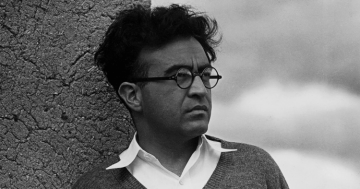Sudip Bose at The American Scholar:
 Although Chávez—born on this date in 1899—received his earliest musical training from his brother, and though he did study for a time with the composer Manuel Ponce, he largely taught himself how to write music by studying the scores of others. Early on, he became interested in furthering the cause of Mexican classical music, while reimagining its possibilities in the 20th century. Should it draw heavily from folk styles? How Mexican should it be? How avant-garde? Perhaps most crucial of all: How could a composer forge a style out of so many various elements: native Indian music, the plainsong brought by the conquistadores, the peasant dances of the countryside, the ballad-like corridos—to say nothing of the European symphonic and operatic literature? These questions must have been swimming in his head when, at the age of 21, Chávez traveled to Austria, Germany, and France. In Paris, he befriended Paul Dukas (composer of The Sorcerer’s Apprentice), who instructed the young man to incorporate vernacular Mexican music into his pieces, pointing to the example of Manuel de Falla, who had been doing similar things in Spain with Spanish music.
Although Chávez—born on this date in 1899—received his earliest musical training from his brother, and though he did study for a time with the composer Manuel Ponce, he largely taught himself how to write music by studying the scores of others. Early on, he became interested in furthering the cause of Mexican classical music, while reimagining its possibilities in the 20th century. Should it draw heavily from folk styles? How Mexican should it be? How avant-garde? Perhaps most crucial of all: How could a composer forge a style out of so many various elements: native Indian music, the plainsong brought by the conquistadores, the peasant dances of the countryside, the ballad-like corridos—to say nothing of the European symphonic and operatic literature? These questions must have been swimming in his head when, at the age of 21, Chávez traveled to Austria, Germany, and France. In Paris, he befriended Paul Dukas (composer of The Sorcerer’s Apprentice), who instructed the young man to incorporate vernacular Mexican music into his pieces, pointing to the example of Manuel de Falla, who had been doing similar things in Spain with Spanish music.
more here.
